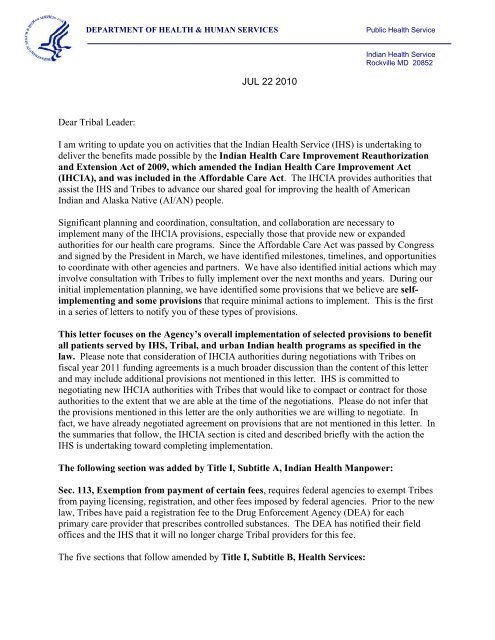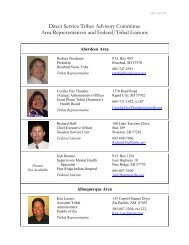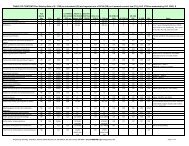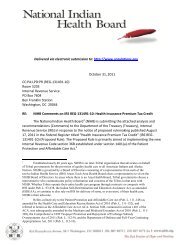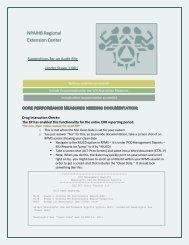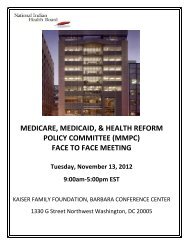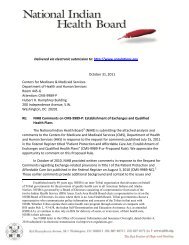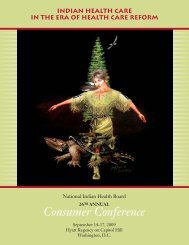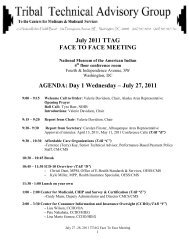Dear Tribal Leader Letter
Dear Tribal Leader Letter
Dear Tribal Leader Letter
You also want an ePaper? Increase the reach of your titles
YUMPU automatically turns print PDFs into web optimized ePapers that Google loves.
DEPARTMENT OF HEALTH & HUMAN SERVICESPublic Health ServiceIndian Health Service Rockville MD 20852JUL 22 2010<strong>Dear</strong> <strong>Tribal</strong> <strong>Leader</strong>:I am writing to update you on activities that the Indian Health Service (IHS) is undertaking todeliver the benefits made possible by the Indian Health Care Improvement Reauthorizationand Extension Act of 2009, which amended the Indian Health Care Improvement Act(IHCIA), and was included in the Affordable Care Act. The IHCIA provides authorities thatassist the IHS and Tribes to advance our shared goal for improving the health of AmericanIndian and Alaska Native (AI/AN) people.Significant planning and coordination, consultation, and collaboration are necessary toimplement many of the IHCIA provisions, especially those that provide new or expandedauthorities for our health care programs. Since the Affordable Care Act was passed by Congressand signed by the President in March, we have identified milestones, timelines, and opportunitiesto coordinate with other agencies and partners. We have also identified initial actions which mayinvolve consultation with Tribes to fully implement over the next months and years. During ourinitial implementation planning, we have identified some provisions that we believe are selfimplementingand some provisions that require minimal actions to implement. This is the firstin a series of letters to notify you of these types of provisions.This letter focuses on the Agency’s overall implementation of selected provisions to benefitall patients served by IHS, <strong>Tribal</strong>, and urban Indian health programs as specified in thelaw. Please note that consideration of IHCIA authorities during negotiations with Tribes onfiscal year 2011 funding agreements is a much broader discussion than the content of this letterand may include additional provisions not mentioned in this letter. IHS is committed tonegotiating new IHCIA authorities with Tribes that would like to compact or contract for thoseauthorities to the extent that we are able at the time of the negotiations. Please do not infer thatthe provisions mentioned in this letter are the only authorities we are willing to negotiate. Infact, we have already negotiated agreement on provisions that are not mentioned in this letter. Inthe summaries that follow, the IHCIA section is cited and described briefly with the action theIHS is undertaking toward completing implementation.The following section was added by Title I, Subtitle A, Indian Health Manpower:Sec. 113, Exemption from payment of certain fees, requires federal agencies to exempt Tribesfrom paying licensing, registration, and other fees imposed by federal agencies. Prior to the newlaw, Tribes have paid a registration fee to the Drug Enforcement Agency (DEA) for eachprimary care provider that prescribes controlled substances. The DEA has notified their fieldoffices and the IHS that it will no longer charge <strong>Tribal</strong> providers for this fee.The five sections that follow amended by Title I, Subtitle B, Health Services:
Page 3 – <strong>Tribal</strong> <strong>Leader</strong>The three sections that follow are amended and added by Title I, Subtitle D, Access to HealthServices:Sec. 151, Treatment of payments under the Social Security Act (SSA) health benefitsprograms, reemphasizes that the IHS and Tribes update provider enrollment numbers and mustprovide the numbers to the HHS Secretary in order to receive reimbursements for payments fromMedicaid, Medicare, Children’s Health Insurance Program, and other third-party payers forservices. IHS will work with Tribes to determine a strategy to ensure compliance with thisprovision.Sec. 156, Nondiscrimination under federal health care programs in qualifications forreimbursement for services, prohibits discrimination against <strong>Tribal</strong> health programs underfederal health care programs if they meet the generally applicable state or other requirements forparticipation. This provision eliminates the requirement for licensure if standards for licensureare otherwise met. IHS may consider future implementation measures to ensure that thisprovision is consistently observed by all federal health care programs.Sec. 157, Access to Federal insurance, allows a Tribe or <strong>Tribal</strong> organization carrying out aprogram under the ISDEAA and an urban Indian organization carrying out a program under TitleV of the IHCIA to purchase coverage for its employees from the Federal Employees HealthBenefits Program. While the law creates this new authority, a mechanism needs to be developedto administer this option for Tribes and urban Indian organizations. IHS recognizes that Tribesare very interested in this provision and we have been working with the Office of PersonnelManagement to implement this provision and will consult with Tribes in the near future.Title I, Subtitle E, Health Services for Urban Indians.Sec. 162, Treatment of certain demonstration projects, made the Tulsa and Oklahoma Cityclinic demonstration projects permanent service units. They are not subject to contracting orcompacting under the ISDEAA. The Oklahoma City Area IHS will communicate further withthe two Program Directors and the Tribes in the Oklahoma City Area on how to formallyincorporate these programs as service units in the Area.Sec. 171, Establishment of the Indian Health Service as an Agency of the Public HealthService expands the authorities of the IHS Director to: (1) facilitate advocacy for thedevelopment of appropriate Indian health policy and; (2) promote consultation on matters relatedto Indian health. These provisions are a significant step in acknowledging the importance of thegovernment-to-government relationship between the U.S. and Indian Tribes and give the IHSDirector broader responsibilities for advising the Secretary on matters related to Indian health,and to collaborate and coordinate with other agencies and programs of the Department. Irecently discussed this provision with the Secretary and she supports my expanded role inadvocating for Indian health issues and policy within the Department. This was a goal of minewhen I first was appointed the IHS Director, and I have already met with several agency heads
Page 4 – <strong>Tribal</strong> <strong>Leader</strong>and am at the table at all meetings with agency heads where decisions are made. The Agency’spartnership and consultation activities with Tribes ensure that I can maximize the impact of thisnew and expanded role on improving health for American Indians and Alaska Natives across theentire Department of Health and Human Services.I am committed to effective and meaningful consultation with Tribes to fully implement thisimportant legislation as soon as possible. In a letter to <strong>Tribal</strong> leaders on May 12, HHS and IHSinitiated a formal consultation to ensure a strong partnership during implementation andrequested your input on the consultation process and on priorities for implementation. The letteris posted at http://www.ihs.gov/<strong>Tribal</strong><strong>Leader</strong>s/triballetters/index.cfm. If you have not providedinput, I encourage you to do so in writing or by email to consultation@ihs.gov. Although theJuly 1 deadline has passed, your input is still welcome. Your input will support our consultationeffort and move us toward timely and inclusive implementation of the IHCIA.Finally, I want to underscore my commitment throughout this process to strengthen ourpartnership with Tribes by making the Agency’s work accountable and transparent. I willcontinue to update you as progress is made on implementation of the IHCIA. I will send youanother letter detailing more provisions in the near future.Sincerely yours,/Yvette Roubideaux/Yvette Roubideaux, M.D., M.P.H.Director


